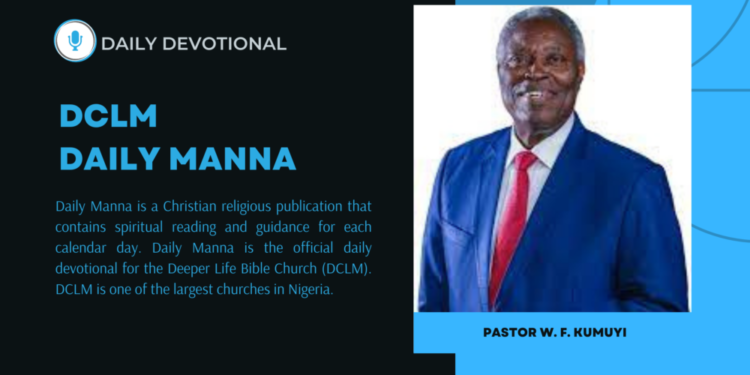DCLM Daily Manna 2025: DCLM Daily Manna 12 November 2025: Proper Response to Prophesy
Text: Daniel 9:4–19 (KJV)
nd I prayed unto the Lord my God, and made my confession, and said, O Lord, the great and dreadful God, keeping the covenant and mercy to them that love him, and to them that keep his commandments;
5 We have sinned, and have committed iniquity, and have done wickedly, and have rebelled, even by departing from thy precepts and from thy judgments:
6 Neither have we hearkened unto thy servants the prophets, which spake in thy name to our kings, our princes, and our fathers, and to all the people of the land.
7 O Lord, righteousness belongeth unto thee, but unto us confusion of faces, as at this day; to the men of Judah, and to the inhabitants of Jerusalem, and unto all Israel, that are near, and that are far off, through all the countries whither thou hast driven them, because of their trespass that they have trespassed against thee.
8 O Lord, to us belongeth confusion of face, to our kings, to our princes, and to our fathers, because we have sinned against thee.
9 To the Lord our God belong mercies and forgivenesses, though we have rebelled against him;
10 Neither have we obeyed the voice of the Lord our God, to walk in his laws, which he set before us by his servants the prophets.
11 Yea, all Israel have transgressed thy law, even by departing, that they might not obey thy voice; therefore the curse is poured upon us, and the oath that is written in the law of Moses the servant of God, because we have sinned against him.
12 And he hath confirmed his words, which he spake against us, and against our judges that judged us, by bringing upon us a great evil: for under the whole heaven hath not been done as hath been done upon Jerusalem.
13 As it is written in the law of Moses, all this evil is come upon us: yet made we not our prayer before the Lord our God, that we might turn from our iniquities, and understand thy truth.
14 Therefore hath the Lord watched upon the evil, and brought it upon us: for the Lord our God is righteous in all his works which he doeth: for we obeyed not his voice.
15 And now, O Lord our God, that hast brought thy people forth out of the land of Egypt with a mighty hand, and hast gotten thee renown, as at this day; we have sinned, we have done wickedly.
16 O Lord, according to all thy righteousness, I beseech thee, let thine anger and thy fury be turned away from thy city Jerusalem, thy holy mountain: because for our sins, and for the iniquities of our fathers, Jerusalem and thy people are become a reproach to all that are about us.
17 Now therefore, O our God, hear the prayer of thy servant, and his supplications, and cause thy face to shine upon thy sanctuary that is desolate, for the Lord’s sake.
18 O my God, incline thine ear, and hear; open thine eyes, and behold our desolations, and the city which is called by thy name: for we do not present our supplications before thee for our righteousnesses, but for thy great mercies.
19 O Lord, hear; O Lord, forgive; O Lord, hearken and do; defer not, for thine own sake, O my God: for thy city and thy people are called by thy name.
KEY VERSE: Daniel 9:4 (KJV)
“And I prayed unto the LORD my God, and made my confession, and said, O Lord, the great and dreadful God, keeping the covenant and mercy to them that love him, and to them that keep his commandments.”
The Bible’s prophetic passages often stir different responses in readers. Some find them enlightening, others confusing or distant. For some, prophecies are blueprints of future events; for others, they are merely symbolic or historical. Yet the real question remains: “How should we respond to prophecy?”
In today’s text, Daniel shows us the right example. After studying Jeremiah’s prophecy about Israel’s seventy years of captivity, Daniel realised the set time for deliverance was near. Instead of celebrating or demanding release, he turned to God in earnest prayer and repentance. He confessed his nation’s sins and sought divine mercy, knowing that spiritual restoration must precede physical freedom.
Daniel understood that returning to Judah without true repentance would be meaningless. He recognised that God’s promises are conditional on obedience and a restored relationship with Him. Thus, Daniel’s first priority was reconciliation with God, not the mere end of captivity.
His perspective reveals deep spiritual maturity. Daniel viewed exile as a shameful curse caused by sin. He understood that God desired His people’s freedom—but freedom built on holiness and renewed fellowship, not rebellion. Instead of focusing on when deliverance would come, he focused on why it was needed and how to prepare for it.
Today, this challenges us not just to interpret or admire prophecies, but to let them transform us. True understanding of Scripture should drive us to repentance, prayer, and righteous living. Prophecy is not merely to inform but to inspire action.
THOUGHT FOR THE DAY:
Don’t just accumulate scriptural knowledge; let it move you to action.
THE BIBLE IN ONE YEAR:
Ezekiel 3–5
Daily Manna 12 November 2025
















Comments 2